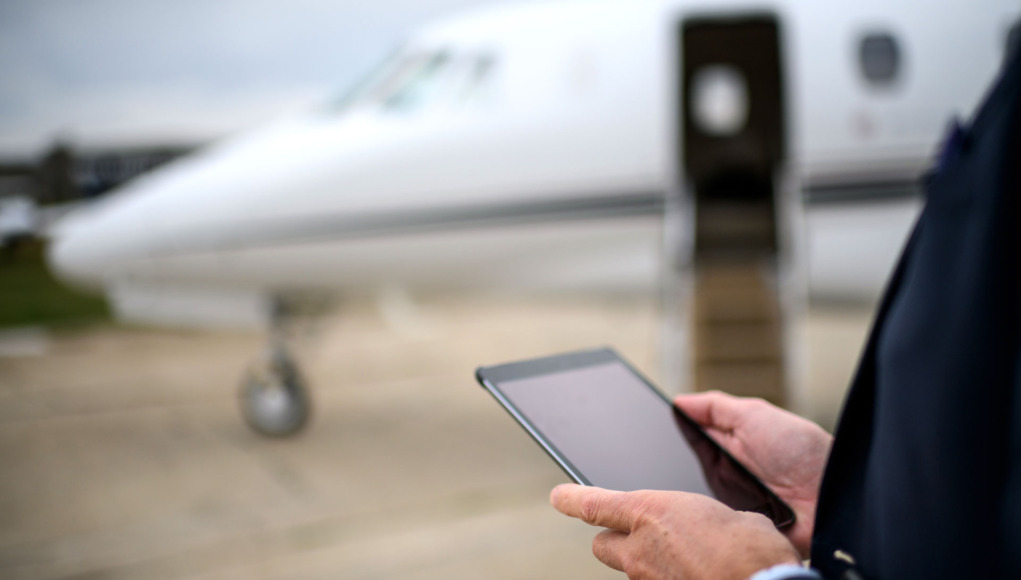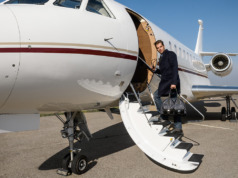Almost 2,000 direct air carriers (charter operators), licensed by the FAA, operate more than 11,000 business aircraft, on which more than 1.5 million hours will be flown by charter customers this year. You may be among them.
In order to book a charter trip, you have two choices: you or your representative either can approach a licensed air carrier directly to make the arrangements, or you can contact an “air charter broker,” that is, an individual or company which connects charter customers with licensed charter operators.
The relative ease and anonymity of doing business on the internet has spawned a proliferation of less-than-reputable brokers and brokerage firms which engage in shady practices, each claiming to offer you “the best trip for the lowest price.” As of this writing, charter brokers are unregulated. However, the U.S. Department of Transportation has issued first-ever rules for brokers, which go into effect on February 14.
For every flight, the broker must disclose:
- The name and legal D.B.A.(s) of the operator.
- The capacity in which the broker is acting. Is the broker an agent of the operator, or an agent of you, the charterer?
- Any additional liability insurance the broker carries.
Upon your request, the broker must disclose:
- (If acting as your agent), any corporate or business relationships with the operator “that may have a bearing” on the selection.
- The total cost of the flight (though it does not have to be itemized).
- The amount of any fees that you would have to pay directly (deicing, hangar, catering, etc.).
Reputable brokers have been following these practices all along. And since full enforcement is going to take some time, when you book a charter trip, you need to do your homework to find a trustworthy broker.

What Qualities Should You Look for In a Broker?
1 A Commitment to Safety – A reputable broker will use only experienced, government-certified charter operators which both comply with current safety regulations and operate to the highest safety standards 100% of the time. Such brokers will subscribe to one or both of the industry recognized and accepted safety auditors, ARGUS International and Wyvern, Ltd. Since some unscrupulous brokers claim to have such status – even going so far as to illegally copy the auditors’ logos on their websites – it’s imperative that you confirm their status here: (https://cheq.argus.aero/BrokerRegistry/BrokerRegistry) or (www.wyvernltd.com/solutions-wyvern-broker-directory) before you fly. For every trip, the broker will show you (and you should request to see) the ARGUS Trip Cheq or Wyvern Wingman Standard PASS report, each proof that the aircraft and crew meet the highest safety standards. Since brokers do not operate the aircraft, they cannot absolutely guarantee your safety. However, they should guarantee that they have used all available tools to properly vet the operators they use.
2 Experience and Length of Time In Business – Using the internet search term “business jet charter broker,” you’ll not only find many reputable (as well as those fly-by-night) brokers – you’ll also find plentiful information on how to start your own jet charter brokerage! That’s because until the new DOT rules go into effect, there is no government regulation to oversee charter brokers. Searching the broker’s name and background may offer you peace of mind – or help you steer clear. Reputable brokers generally list their names, backgrounds, and often their photos, on their websites. Avoid booking trips via “faceless” apps. Does the broker you are considering have a brick-and-mortar office where you can meet with them and their staff?
3 Industry Knowledge – Does the broker actually know what they’re talking about? Will they promise you something that simply isn’t true? For example, a shady broker may sell you a trip on a particular aircraft, falsely claiming it can fly nonstop to your destination. Foreign travel can be especially fraught for the charter user. If you’ll be flying internationally, look for a broker who understands the specific requirements for visas, landing fees, permits, and international handling (See: “Global Reach,” BAA May/June 2018).
4 Eagerness to Meet Your Needs – Not only will a good broker work hard to match you with the correct aircraft for your flights, they also want to give you the best possible experience when you fly. If you have special requests for the flight, do let the broker know. They will do everything possible to meet them – or provide suitable alternatives. For example, Wi-Fi currently is the most popular request on today’s charter flights. In some cases, Wi-Fi is included in the cost of the trip, but in others you are charged by the megabyte for your usage. This could be a very costly experience – running into tens of thousands of dollars – if your phone or tablet is connected and performs a software update during your flight, or if you choose to watch a movie. While some Wi-Fi programs are very fast, others are the equivalent of dial-up, so acceptable only for briefly checking emails. Be sure to express your needs to the broker who will be able to direct you to the correct option for your trip.
5 Clear Communication – Can you reach the broker 24 hours a day? Do they answer all your questions clearly and promptly? Do you feel as though your questions are being answered fully and truthfully? A good broker will listen carefully to your needs, then suggest the most cost-effective type of aircraft best suited for that trip. For example, you may request a Citation X but the mission may warrant a different aircraft to meet your request for a nonstop flight. A good broker will educate you on options. They will be proactive in asking questions about your trip, and will prompt you for your schedule and provide a timeline for the parameters of your trip. Good communication goes both ways. It is imperative for you to express your own safety standards. If you don’t do so, the broker will default to their standards, which could differ from yours.
6Straightforward Business Practices – You won’t find an honestbroker using the lure of “too-good-to-be-true” pricing to attract new customers, then reverting to a more traditional model once the first few trip “deals” are done. Look for a firm that is upfront with you, and doesn’t promise what cannot be delivered. For each trip, the broker should disclose the operator on whose aircraft you’ll be flying, and will inform you if a change must be made as well as any applicable price differential. And you’ll normally pay less for a charter trip on an aircraft that is based near your departure point, since one based elsewhere will have to be “ferried” to you – and you pay for that positioning segment of the trip. The broker will do their best to source the appropriate aircraft nearest your departure point, and will tell you where that aircraft is based.
7 Investment In the Industry – The broker actively participates in the business aviation industry via continuing education and events, as well as affiliations or memberships in national and regional trade associations.
8 Transparency About Payment – Operators generally provide a discount to brokers based on an industry standard, volume of business, and past experience, which then may become the broker’s commission for booking your trip. A reputable broker will gladly answer your questions about their fees.
9 Proactive with paperwork – A reputable broker will provide the tail number of your charter aircraft 24 hours in advance of your trip. This information will be listed on the Wyvern Wingman Standard PASS report or ARGUS Trip Cheq, and will ensure that the aircraft on which you are flying has been approved for service by the FAA.
10 Sets clear expectations – A reputable broker will set the stage for your experience of flying on a charter aircraft. This would include setting expectations for when things go well and when there are disruptions. Brokers can provide advance information for weather, ATC delays, and necessary permits and/or reservations for landing (“slots”). And although of course they cannot provide advance information for domestic or international mechanical failures, they will be ready with a back-up plan. Due to charter permitting lead times, this sometimes may be a commercial flight.

How Do You Find Such a Broker?
- Ask Your Friends – Personal referrals often are valuable. Touch base with your network to see who uses a reliable, trustworthy charter broker.
- Do a Careful Search – Using a simple internet search, or LinkedIn, delve into the principals’ professional history and qualifications. Before becoming a broker, were they in another segment of the aviation business? Or are they newcomers who view the charter business as easy access to your wallet? Look for those who have been in the trenches and thoroughly understand the charter world.
- Ask for References – Any reputable broker will be flattered to provide references that may include clients and operators, and will welcome you to their office. Do your due diligence and check the references.
- Look for Industry Accreditation – Brokers who subscribe to the ARGUS Standard and the Wyvern Registered Broker program have access to operators and aircraft that meet the industry-accepted safety standards.
Since you’ll want to establish an ongoing relationship with your broker, ask yourself these questions: Is the broker’s practices and way of doing business a good match with your company policies, procedures, and expectations? Would you recommend this firm to your friends? When you’re not flying for business, would you use this broker to book a trip for your children or grandchildren?
Taking these steps can help ensure that you find a trustworthy broker to help you meet your charter flying needs. BAA
Contributing to this report is Brian Waldron, Founder and President of The Flight Department USA, Inc. In his 25+ years in business aviation, first with NetJets and then with GE Corporate Transport, he’s managed more than 450,000 flight hours.
Holly Whitaker is President of Exclusive Air, Inc., which she founded in 1991. The former Chair of NBAA’s Schedulers and Dispatchers Committee, she holds an MBA and is co-founder of Business Aviation Professionals of New England.






how about use NO broker and go straight to the operator…
Happy New Year Holly!
Hoping all is well with you. Great, great article! I’ll be sending this to numerous clients and prospects that have mentioned brokers. It is still quite fascinating to me how so many wealthy and smart private flyers are lured by glossy mailer and/or wiz-bang website when there is nothing behind either This article helps continue the effort to educate private aircraft users and weed out the unqualified brokers. Thank you for sharing.
Great piece with excellent points to consider. Shared to @bizavjets (twitter)